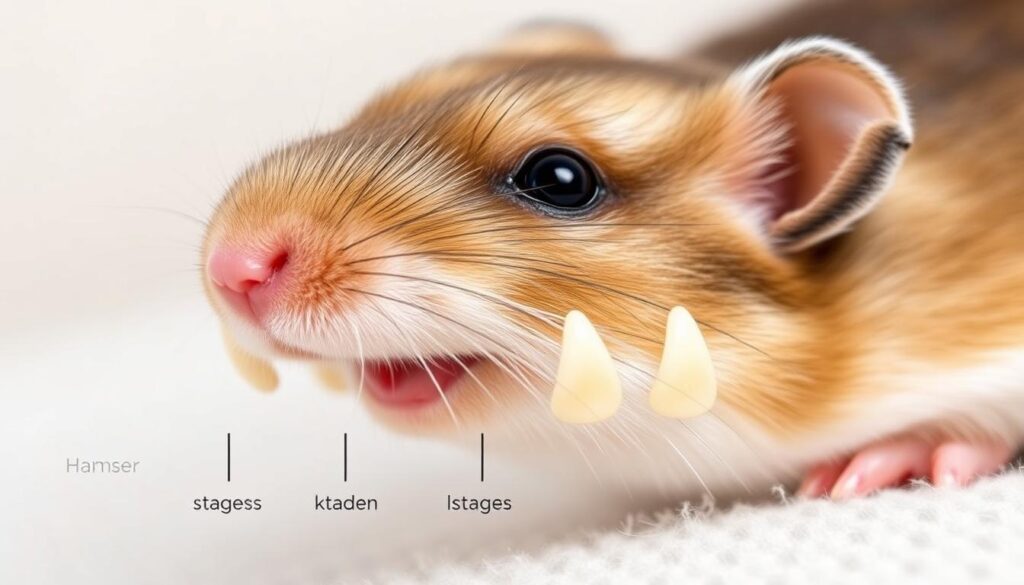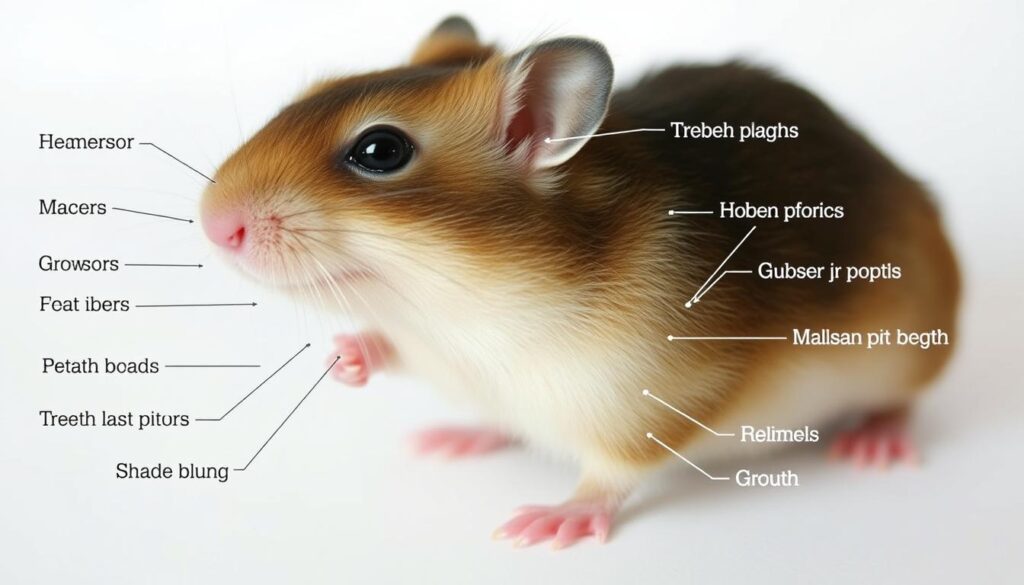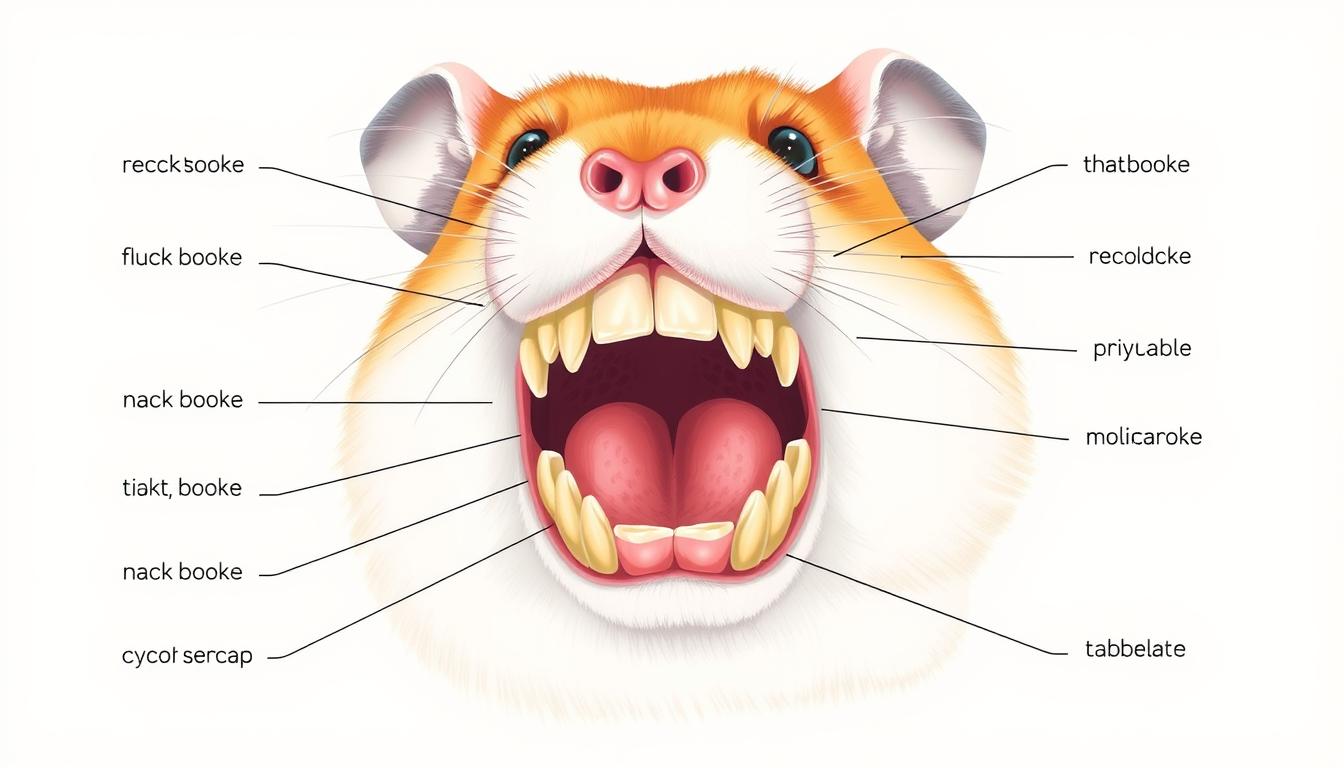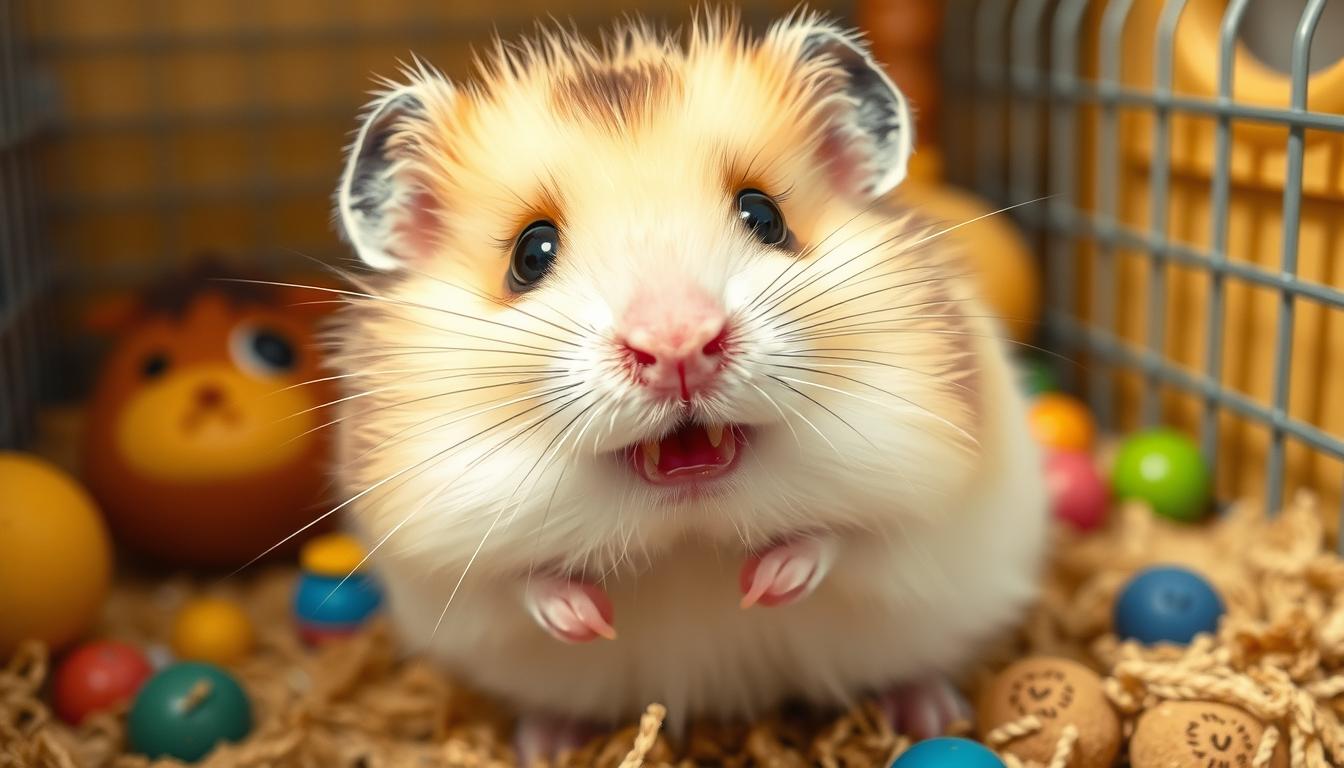Do you know that your hamster’s teeth health is key to their happiness? Let’s explore the amazing details of their dental anatomy. We’ll see why knowing about their teeth is vital for their health and joy. Join us as we dive into the world of hamster dental health with a detailed hamster teeth diagram.
Key Takeaways
- Explore the unique rodent tooth structure that sets hamsters apart from other pets.
- Understand the importance of continuous incisor growth and the role of chewing in maintaining healthy teeth.
- Identify the different parts of a hamster’s teeth using a comprehensive diagram.
- Recognize common dental issues like overgrown teeth and learn effective strategies for maintaining proper oral care.
- Discover the best dietary choices and chew toys to promote strong and healthy teeth in your hamster.
Introduction to Hamster Dental Anatomy
Hamsters have a special dental anatomy, different from many pets. Their teeth grow continuously, and chewing helps keep their mouths healthy. Knowing about hamster teeth is key to caring for them well.
The Unique Rodent Tooth Structure
Hamsters have teeth that grow and sharpen as they chew. Their incisors have hard enamel on the front and softer dentine on the back. They also don’t have canine teeth, but their molars and premolars help grind food.
Why Understanding Hamster Teeth is Important
Knowing about hamster teeth is vital for their health and happiness. Problems like overgrown teeth can cause eating issues, pain, and serious health problems. By understanding their teeth, we can spot and fix issues early, keeping our hamsters happy and healthy.
“Proper dental care is essential for the overall health and wellbeing of hamsters, as their teeth are constantly growing and require regular maintenance.”
The Hamster Incisor Teeth
Hamsters are famous for their buck-toothed look. They have two sets of incisors, one on top and one on the bottom. These teeth grow all their lives, which is key to their health.
Continuous Growth and Importance of Chewing
Hamsters’ incisors grow forever, unlike human teeth. This lets them keep their teeth sharp for chewing. But, they need to chew a lot to avoid their teeth getting too long.
If they don’t chew enough, they might get hamster teeth overgrowth. This makes eating, grooming, and even closing their mouth hard.
Knowing about hamster incisor growth and chewing is vital. It helps keep these pets’ teeth healthy and happy.
“A hamster’s teeth never stop growing, which is why they must chew constantly to keep their teeth in check.”

Hamster Teeth Diagram
To understand your hamster’s dental health, knowing their teeth is key. A detailed hamster teeth diagram offers insights into their teeth’s structure and function.
Labeling the Different Parts of Hamster Teeth
Knowing the parts of a hamster’s teeth helps you spot dental health issues. Let’s look at the main parts of a hamster’s dental anatomy:
- Incisors: Sharp, chisel-like front teeth for gnawing and cutting.
- Molars: Flat, grinding teeth in the back for chewing and breaking down food.
- Enamel: The hard, outer layer protecting the tooth from wear and tear.
- Dentin: The inner layer giving the tooth structure and support.
- Pulp: The soft, living tissue at the tooth’s center with nerves and blood vessels.

Understanding a hamster’s teeth helps you grasp their unique dental anatomy. It also helps you spot any dental problems early.
Hamster Molar Teeth: The Grinding Machines
Hamsters have molar teeth that help them chew and grind food. These teeth are key for breaking down tough foods. Keeping them healthy is important for your hamster’s well-being.
Hamster molar teeth are made for grinding food. They have flat surfaces and sharp ridges. This helps them chew and crush even hard foods.
Knowing about hamster molar teeth is key for their dental care. Watching their teeth helps prevent dental problems. It keeps your hamster healthy.
Regular vet visits and a balanced diet are good for hamster molar teeth. Taking care of their dental anatomy ensures a happy life for your hamster.
Common Dental Issues in Hamsters
Hamsters make great pets and need our care to stay healthy. This includes keeping their teeth in good shape. They can face dental problems that hurt and can be serious if not treated.
Identifying Overgrown Teeth
Hamster teeth overgrowth is a big issue. Their teeth grow all the time. Without enough to chew on, these teeth get too long.
Overgrown teeth hurt, make eating hard, and can cause serious health issues if not fixed.
Here are signs of overgrown hamster teeth:
- Teeth that look too long or stick out
- Hard time closing the mouth or chewing
- Weight loss or eating less
- Drooling or trouble grooming
Other Oral Health Concerns
Hamsters can also face other dental problems. These include:
- Dental abscesses: Painful infections around the teeth or gums
- Malocclusions: Teeth don’t line up right because of jaw issues
- Tooth fractures: Teeth break or crack from chewing hard things
It’s important to catch and treat these dental problems in hamsters fast. Regular vet visits and the right chew toys can help prevent and manage these issues.
“Taking care of your hamster’s teeth is key to their health. Even small problems can get worse and hurt their life quality.”
Maintaining Proper Dental Health
Keeping your hamster’s teeth healthy is key to their wellbeing. A balanced diet with lots of fibrous foods is crucial. Also, giving them chew toys regularly helps prevent teeth overgrowth.
Diet and Chew Toys for Healthy Teeth
For your hamster’s oral care, feed them a diet rich in hay, fresh veggies, and a bit of quality pellets. These foods help wear down their teeth. Adding safe chew toys, like untreated wood or cardboard tubes, also keeps their teeth in check.
- Feed a diet high in hay, fresh vegetables, and a small amount of high-quality pellets
- Provide safe chew toys like untreated wood blocks or cardboard tubes
- Regularly monitor your hamster’s teeth for signs of overgrowth
Understanding dental health is vital. The right care can keep your hamster happy and healthy, avoiding teeth overgrowth.
“Proper dental care is essential for a hamster’s overall health and longevity. A balanced diet and regular chewing on suitable toys can make a big difference.”
Remember, caring for your hamster’s teeth is a continuous task. But the joy of having a happy, healthy pet makes it all worth it.
Conclusion
In this guide, we’ve looked into the world of hamster dental anatomy through a detailed hamster teeth diagram. Knowing about your hamster’s teeth is key for their health. By spotting common dental issues and using the right care strategies, we can keep our furry friends happy and healthy.
The hamster dental anatomy we’ve covered, including the rodent tooth structure, shows how important your pet’s teeth are. It’s vital to watch for hamster teeth overgrowth and other oral health concerns to keep them well.
By focusing on hamster oral care with the right diet and chew toys, we can keep their teeth in top shape. A healthy smile is the key to your hamster’s happiness and long life.




